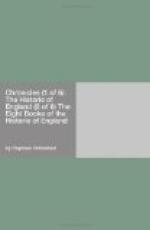It happened one day, as she meant to haue poisoned a yoong gentleman, against whome she had a quarell, the king chanced to tast of that cup, and died thereof (as before ye haue heard.) Hir purpose indeed was not to haue poisoned the king, but onelie the yoong gentleman, the which drinking after the king, died also, the poison was so strong and [Sidenote: A decree of the kings of the Westsaxons against their wiues.] vehement. For hir heinous crime it is said that the kings of the Westsaxons would not suffer their wiues to be called queenes, nor permit them to sit with them in open places (where their maiesties should bee shewed) manie yeeres after. Ethelburga fearing punishment, fled into France with great riches and treasure, & was well cherished [Sidenote: The end of Ethelburga. Simon Dun.] in the court of king Charles at the first, but after she was thrust into an abbeie, and demeaned hirselfe so lewdlie there, in keeping companie with one of hir owne countriemen, that she was banished the house, and after died in great miserie.
[Sidenote: Wil. Malm. Kenulfe.] Egbert king of Mercia departing this life, after he had reigned foure moneths, ordeined his coosine Kenulfe to succeed in his place, which Kenulfe was come of the line of Penda king of Mercia, as rightlie descended from his brother Kenwalke. This Kenulfe for his noble courage, wisdome, and vpright dealing, was woorthie to be compared with the best princes that haue reigned. His vertues passed his fame: nothing he did that enuie could with iust cause reprooue. At home he shewed himselfe godlie and religious, in warre he became [Sidenote: The archbishops see restored to Canturburie.] victorious, he restored the archbishops see againe to Canturburie, wherein his humblenes was to be praised, that made no account of worldlie honour in his prouince, so that the order of the ancient canons might be obserued. He had wars left him as it were by succession from his predecessour Offa against them of Kent, and thervpon entring that countrie with a mightie armie, wasted and [Sidenote: The king of Kent taken prisoner.] spoiled the same, and encountering in battell with king Edbert or Ethelbert, otherwise called Prenne, ouerthrew his armie, and tooke him prisoner in the field, but afterwards he released him to his great praise and commendation. For whereas he builded a church at Winchcombe, vpon the day of the dedication thereof, he led the Kentish king as then his prisoner, vp to the high altar, and there set him at libertie, declaring thereby a great proofe of his good nature.
There were present at that sight, Cuthred whom he had made king of Kent in place of Ethelbert, or Edbert, with 13 bishops, and 10 dukes. The noise that was made of the people in reioising at the kings bountious liberalitie was maruellous. For not onelie he thus [Sidenote: Kenulfs liberalitie towards churchmen which was not forgotten by them in their histories.] restored the Kentish king to libertie, but also bestowed




